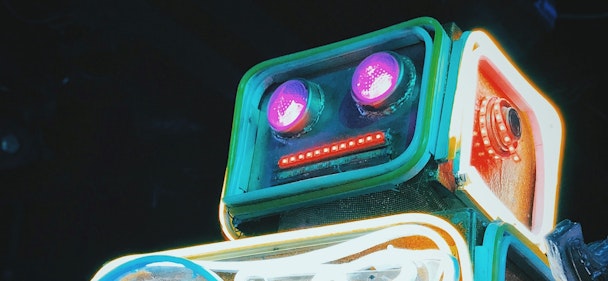Mind vs machine: do androids dream of buying electric sheep?
In the short term, we might hope that artificial intelligence (AI) will help us improve brand experiences, for example by mitigating bias. But what about the longer-term? If we succeed in creating ‘true’ AIs, what will be the fate of marketing – which has always relied on our all-too-human quirks, foibles and irrationalities? Woven’s Mark Bower has questions for future brand builders.

Woven's Mark Bower on marketing to (and by and for) machines / Alec Favale via Unsplash
The impact of digital technology on the marketing landscape has been revolutionary over the last twenty years. But throughout all this disruption, one thing has remained constant: people are influenceable, often in quite predictable ways.
The bottom line is, we are sentient apes struggling to make sense of the modern world using seriously out-of-date hardware. And the art of brand-building has evolved to exploit our all-too-human idiosyncrasies for profit. Our hopes, our fears, our irrational likes and dislikes. Our brains are routinely hijacked by attractive images, clever copy, and annoying but ‘catchy’ jingles.
And thank goodness. Or most of us would be out of a job.
But here’s the issue. One day soon we might be out of a job after all. What happens if (or when) we build a complex 'brain' from silicon or another inanimate substance? How will we market to machines – and how will they market to us?
Will brain building impact brand building?
There’s much debate about how likely it is that we can ever achieve such a feat. But then there are also plenty of very smart people who believe it's only a matter of time.
'Is there anything special about a computer made of meat?' asked neuroscientist Sam Harris. He's not the only one pondering such issues.
Today's sophisticated neural networks digest complex sets of unstructured data in milliseconds. Sifting and filing. Looking for patterns. Making sense of the nonsensical. Finding hitherto unseen connections. Often, the outputs of these systems are novel and different to those so far achieved by any human.
The reality is that we are no longer building computers. With AI, we are already in the business of building brains.
Replace us with the things that do the job better
This could pose a double threat for those of us in the branding business.
On the one hand, we may well find that, as with almost everything else, the AI is simply way better at teasing apart the intricacies of the human psyche than any actual human could ever be. Let’s face it, most of us don’t really understand why we do half the things we do. But an AI might.
Chugging through vast quantities of behavioral data, an AI-equipped ‘virtual creative director 3000’ may be capable of spitting out 1,000 hyper-targeted, staggeringly insightful Cannes Lion Award-winning campaigns per second at the press of a button.
Which would make us look bad.
Cyborg consumption
In the meantime, our once knuckle-dragging, semi-sentient primate audiences might have become AI-equipped cyborgs, with near-infinite onboard computing power.
Even in the near-term, the adoption of increasingly smart AI-enabled 'assistants' (Siri and Alexa on steroids) will become the norm. It's likely that these 'assistants' will be somehow permanently 'integrated' with us.
Bond-villain-in-waiting and future master of the universe Elon Musk claims "we’re already a cyborg [sic]". We’re already connected 24/7 to the web via our smartphones and other devices. It's now a question of the human/machine interface getting faster. And then disappearing completely.
We’re already using AI to iterate itself, increasing the pace of development further. Before long, we’ll be able to achieve 20- or 30-years’ worth of learning on any subject in minutes. What took ‘digital’ thirty years to achieve could be an afternoon’s worth of progress in the not-too-distant future.
The brand (new) predicament
Does it even make sense to think about influencing an AI? If so, what might its criteria be? Can we expect it to bear any resemblance to our own? Will we be able to choose?
Are we about to enter a stark age of rational, fact-based decision-making? Or will we in fact teach our digital avatars our own human foibles and irrational biases – so that they can better mimic our own personalities?
We do know that we humans have an in-built tendency to want to express ourselves, from cave art to NFTs. We have a deep-seated need to individuate; to say ‘this is me’.
While we might trust our super-Siri to do the weekly grocery shop, optimize our utilities and buy cleaning products, will we be happy to outsource the procurement of big, fun items such as cars and holidays to such machines?
Doubling down
In the meantime, what advice can we offer the brands of today in the face of this dystopian-sounding near-future?
It seems to me that the only viable defense is, as it has always been, to double down on everything that we already know works about branding. And that starts with gaining an ever-more intimate understanding of your audience.
And expand your thinking when it comes to what it means to be a brand. Go with the technology. Understand it. Understand how it serves your audience. Use it to your advantage.
Whatever you do, don’t wait. Start now. Or better yet, yesterday.
Content by The Drum Network member:

Woven Agency
Woven. We make brands work beautifully.
Take decades of digital experience. A deep understanding of human psychology. Powerful, real-time social insights....

